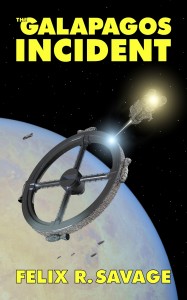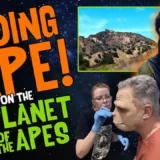 The Galapagos Incident
The Galapagos Incident
Chapter 4.
Elfrida’s ambivalence was widely shared. What nuclear bombs had been to an earlier century, AI was to the 23rd. This dated back to the Mars Incident of 2140, when the AIs running the UN colony on Mars had immolated their human charges in a nanoengineered tectonic event motivated by an eccentric reading of Heidegger. The tragedy had temporarily turned Mars into the brightest thing in Earth’s skies, and engraved a new-old prejudice on humanity’s collective psyche.
But nearly a century and a half had passed since then. The very fact that opposition to AI was now thought of as a political position, rather than common sense, hinted at the difficulty of sustaining it while simultaneously relying on variously regulated, override-enabled, and deliberately crippled machine intelligences to support human colonization of the solar system.
In short, humanity was embroiled in a titanic ideological struggle whose outcome remained unpredictable.
But technology has its own momentum, maybe even its own teleological goals, and the brute fact was that newer machine intelligences toyed with the legal definition of non-AI and subtly transgressed it. Yumiko Shimada had more in common with those Heidegger-reading behemoths of Mars than she had with Elfrida.
Elfrida suspected this, even if she didn’t quite put it that way to herself. That was why she kept Yumiko disabled whenever possible.
But she wouldn’t have to rely on the assistant for the entire mission. 11073 Galapagos was gradually overhauling Venus. During the Kharbage Can’s 5.9 million kilometer journey to the asteroid, that 20-second latency period would dwindle to 10. The scheduled 30-sol duration of her mission would see it shrink all the way down to three seconds, on the edge of plausible solo operation.
If she lasted that long.
****
She had grown up knowing that she was half-Japanese. Her father took a melancholy pride in it. Over her mother’s objections, he had insisted on immersion lessons that allowed her to experience life in the country she would never see, because it no longer existed.
In 2235, Mount Fuji had erupted. Actually, to call this event an eruption was a severe understatement. The flood of lava from the volcano buried Tokyo. The accompanying earthquake broke windows in New York. Buckling the earth’s crust, it triggered a tsunami that inundated the archipelago. When the sea retreated, only the tops of the Japanese Alps remained recognizable. The rest of the country was a graveyard.
“I was five years old,” Elfrida’s father, Tomoki, had once told her. “My parents both worked for the UN. We were living in Zululand. I remember my mother screaming, lying down on the floor. She didn’t move … That’s my first memory, actually.”
Elfrida, scarcely older than five herself at the time of this conversation, had glanced worriedly at her own mother. Might Mom scream and fall on the floor without warning?
“Don’t frighten her, Tommy,” Elfrida’s mother said.
“She needs to know that the world is a frightening place … Hora! Don’t cry. It’s all right, it’s all right. It happened once, but it won’t happen again. They say it was a once-in-ten-million-years eruption.”
When her mother had gone to work, Elfrida pestered him for more. After some prodding, Tomoki Goto began to speak of ghosts.
“They’re still there. Seventy million of them, still trying to get away. If a Japanese person visits the islands, a ghost may attach itself to him and leave with him on the airplane.” Tomoki touched his torso, under his ribcage.
“Don’t go to Japan, Daddy!”
“I won’t. There’s no reason for me to go. My whole family is dead. My Baba and Jiji—my grandparents, your great-grandparents—my aunts and uncles, everyone.”
Elfrida met some of those ghosts a year later in her immersion lessons. Tomoki Goto, a software artist, had tailored the off-the-shelf program using old vid data of his family. For an hour a day, she lived with Baba and Jiji—eliding a generation, she called them that—in Tokyo circa 2015. Of course, Baba and Jiji themselves had not even been born in that century. But it was the earliest setting the software supported, and Tomoki had blithely inserted his family into that era, preferring historical picturesqueness over accuracy.
~Didn’t he think about the effect it would have on your developing psyche? Yumiko asked her.
~What effect? Elfrida subvocalized. ~When I applied for this job, I passed my psychological evaluation on my first try. I didn’t even need any therapy.
~You learned to love the past, to see it as a safe and welcoming place. It wasn’t! In 2015, there were no less than seven wars going on. The death toll from the Arab Spring was nearing half a million. The annexation of Taiwan was only ten years off. Climate change and species-level extinctions were accelerating. The population of Earth was larger, sicker, and unhappier than it had ever been before.
~Well, it wasn’t like that in Japan.
Yumiko remained silent for long enough to suggest that Elfrida had proved her point. Then she changed the voice Elfrida could hear in her headset to one as contrite as an MI could produce. ~Sorry if I offended you. It’s just that I get a bit passionate about these things. So many people have a rose-colored view of the past, and it just wasn’t like that. But I want you to know that I really do value your diversity. It gives you a perspective that I think is incredibly useful in our work out here.
Elfrida bristled at the patronizing bromides, and particularly that our. Yumiko often spoke as if she were an actual employee of COMLI, when in fact she had just rolled off the production line with a memory crystal full of pre-digested opinions.
~That’s fine. I just want to draw some boundaries here, Elfrida said. ~Respect my privacy, and I’ll return the favor. A weak joke, a peace offering. They had to work together.
~Deal, Yumiko said, without seeming to get it.
****
In fact, growing up half-Japanese had been tougher than Elfrida let on. Every time the Gotos moved, the Chinese kids would try to recruit her, only to reject her, as if she were the one at fault, when they found out that she wasn’t half-Chinese but half-Japanese. Fuji had wreaked considerable havoc on China’s urbanized east coast, adding a new grievance to the Middle Kingdom’s oft-replenished stock of grudges against its island neighbor. It was averred on the sinanet to this day that the Japanese had somehow done it on purpose.
Incidental to that, reactions to Elfrida’s parentage generally fell into two camps: embarrassed silence, or pity. The latter was harder to bear. She rarely even dared to try and imagine what it must be like to be her father, a pre-Fuji pureblood.
The term carried a complex charge of revulsion, envy, and mockery. History’s tangle had knotted it together with the fate of the Japanese, who’d preserved their ethnic homogeneity like a Blind community preserving their treasured defect, right up until their extinction.
****
Of course Elfrida did not spend the entire voyage to 11073 Galapagos brooding about these issues. She had little to do on board the Kharbage Can except keep Captain Okoli sweet, which was obviously a futile endeavor, but she had other missions to manage. While Yumiko travelled towards 11073 Galapagos on the Can, Elfrida completed a preliminary assessment on 5597 Mahandra, supervised the evacuation of 12846 Elvis, and wrote up a recommendation that 8033 Vasilov not be purchased for the Project, based on its status as a net contributor to local trade networks. (Dos Santos commended her for that one.) For each of these missions she used a different phavatar.
None of them were stross-class. None asked her about her private life. None spouted opinions. And when she left them to operate independently, they performed their functions with robotic exactitude.
Sometimes she almost missed Yumiko’s feistiness.
****
Not, however, so much that she was willing to let the phavatar manage their initial encounter with the residents of 11073 Galapagos.
The Kharbage Can decelerated, matched the asteroid’s velocity, and anchored itself to the clamps installed where the squid’s mouth would have been, if 11073 Galapagos were the cephalopod it resembled. Elfrida climbed into a spacesuit (Yumiko’s high-end frame did not actually need protection from radiation or the vacuum, but she had to keep up appearances) and followed Captain Okoli out. Half a dozen blue berets came with them, toting shoulder-mounted flechette cannons that made them look like mutant beetles.
The asteroid’s gravity was next to nil. Elfrida clipped a tether onto her suit. When she stepped off the base of the landing platform, she floated down to a dusty layer of regolith marked by overlapping bootprints.
“But where is everyone?” she said edgily.
“Hey! Over here!”
The shout rudely blanketed all the local communication frequencies. Yumiko painted a blood-red route to its origin, complete with blinking arrows, on Elfrida’s heads-up display. Elfrida had backgrounded and muted her, but Yumiko was obviously straining at the leash to participate.
Elfrida detached her tether and bounded over the surface of the asteroid on her gecko grips. A blue beret yelled for her to come back. Screw that. This was her mission.
She risked drifting off into space with every step, but if she did, the Kharbage Can would retrieve her, so all she really risked was looking dumb. Anyway, Yumiko’s reflexes were a dream. Sailing spinwards across the terminator, she passed from day into night. Stars hailed across the sky, and Yumiko let out a parp of excitement.
“Stop right there. Any further’n that,” said the all-frequencies voice, “and they c’n recycle you.”
Elfrida looked down. On her chest glowed the angry red cross of a laser targeting system.
Ten seconds had passed, of course, between this moment and her experience of it. Realizing that Yumiko might by now be a spreading cloud of debris, she lost control of her bowels. She flinched at the warm gush of solids and liquids into her diaper, but with a huge effort she maintained her concentration. She flung out a passionately sincere appeal for civility.
The crosshairs vanished. Elfrida bounded back across the solar mesh. The asteroid tumbled her into blazing sunlight, and across the terminator stalked several spacesuits. Rad-shielded faceplates reflected the ungainly silhouette of the Kharbage Can. Splart-patched elbows cradled projectile rifles.
“What the fuck, Yonezawa,” Captain Okoli complained. “You scared the pants off of my little friend here.”
“You try living in this neighborhood,” said the rude male voice.
Elfrida couldn’t believe this was happening. She tight-beamed a plea to Major Roy, the commander of the peacekeeping platoon. “Can’t you do something?”
But her appeal had lagged events. Before it could reach the major, she saw eight sparks of metal dart out of a port in the Kharbage Can’s crew capsule. They moved too fast for the human eye (but not Yumiko’s optic sensors) to follow. Deploying microcable grapples, each one pounced on a Kalashnikov and carried it off, like a tiny hawk with a giant rabbit. They danced into low orbit with their prizes.
“Couldn’t have done anything,” Major Roy tight-beamed back to her. “No electronics in those antiques. Nothing to emp. It’d have come down to bare knuckles, metaphorically speaking.”
Okoli gloated, “Beauty may be in the eye of the beholder, but you can’t argue with offensive drones. If I give the order, Yonezawa, they’ll need an electron microscope to find what’s left of you. Well?”
“You wouldn’t do that,” Yonezawa said with a smug conviction that seemed to Elfrida very much unwarranted.
“That decision would be his,” Okoli said, saving the face of Major Roy. “But I will never hesitate to put my firepower at the disposal of the United Nations for the purposes of peacekeeping in the solar system. Now have your popguns back, and next time don’t aim them at your best friend in this volume.” He pointed at Elfrida.
“Hello,” she said. “I’m Yumiko Shimada.” COMLI protocol dictated that agents use aliases, to avoid any potential contamination of their real identities by complaints from disgruntled colonists. Since this phavatar had a name, she was using it. “Hajimemashite. I’m here from COMLI, the community liaison department of the United Nations Venus Remediation Project, to conduct a preliminary assessment of this asteroid’s human population. As you know, 11073 Galapagos is on the shortlist of entities which may be purchased by the Project for Cytherean terraforming. My assessment will be submitted for the consideration of the requisitioning committee that will make the final decision with regard to this matter. That’s just to let you know I haven’t got powers of life and death here. Laugh.” She punctuated her spiel with the vocal code for a laugh, one of the vocodes that had spread from text-only communication into regular speech. Vocodes were handy when the other person couldn’t see your face, for instance when a tinted faceplate was in the way. “I’ll just be taking a look at how you live, your standards of living, any unique cultural and ethnic factors that may impinge on your potential resettlement, and submitting that data to headquarters.”
While her speech was still on its way to 11073 Galapagos, Yonezawa started shaking his head and protesting. She involuntarly overrode him. But this worked out for the best. By the time she’d droned to her conclusion, the fight had gone out of him and his companions.
“All right. Whatever. The whole process is rigged, anyway.”
“Let me prove to you that it’s not,” Elfrida said eagerly. “We care about community rights. Not many people know this, but we only recommend purchase in seventy-two percent of cases.”
Before her response went through, Okoli said, “Cheer up. You still have a chance. Make her think that resettling you would be too costly, and you might get to keep this rock for another few orbits.”
“While paying rent to you,” Yonezawa said.
“I’m just helping you understand your options. Kharbage LLC wins either way.”
During this exchange, Elfrida’s little speech about community rights grabbed one of the public channels. Yonezawa gave her a funny look. He had noticed her apparent disregard for the give and take of conversation.
Yumiko said urgently, ~Let me take over. Now.
Unwillingly, Elfrida enabled the assistant. Yumiko was right; she couldn’t keep up in this fast-paced context.
Before the Kharbage Can departed, Captain Okoli took her aside. He pointed at the end of the asteroid that resembled stretched-out tentacles. “See that?”
It was presently night. Sampling a range of optic filters, Elfrida distinguished from the starry background a cluster of lights that crowned the ‘tentacles’ bristling from 11073 Galapagos’s far end. At the same time she experienced an shift in perspective and saw that the ‘tentacles’ might equally resemble spires or steeples, cloaked in silver solar mesh that stretched across the gaps between their bases like roofs.
“These people are crazy enough to builda cathedral on a goddamn asteroid.That’s my kind of crazy. Regardless of what they believe, they deserve a fighting chance.” Okoli gave a trekkie’s shrug, a simultaneous lift of both elbows. “Anyway, as I said, we win either way.”
The Kharbage Can cast off its clamps and glided out of the asteroid’s shadow. Sunlight rang off its dinged-up particle shield cone, and limned the twin hab modules rotating like a propellor around the forward radar dome. The asteroid whirled back into day. Unfolding, the Can’s radiator fins momentarily spread a shadow over them that eclipsed the sun.
Yonezawa turned to Elfrida. “That all the luggage you brought?”
****
Scrambling through the labyrinthine tunnels of the asteroid, Elfrida queued a comment for Yumiko to make when appropriate. “Quite some spin you’ve got on this thing!” As soon as they entered the asteroid, she had felt the spin gravity taking a confident grip on her suit. “How short is your day? I was getting whiplash out there.”
“Present rotation period nineteen minutes forty-four seconds,” Yonezawa said. He had grown a little friendlier, but Elfrida suspected that this meant his distrust of her had set in stone. Superficial friendliness was his way of dealing with it. “As you can imagine, the whole asteroid would’ve flown apart at this rotation speed, if it was still in the condition we found it. We’ve been spinning it up gradually over time, and at the same time reinforcing the splart bonds.”
Sunlight stabbed through natural shafts, splintered into prismatic colors by multiple intervening layers of splart. This nanotic epoxy, the superglue of the space age, would stick anything to anything. Cheap and light, it was the asteroid squatter’s go-to containment fix. The colonists of 11073 Galapagos had made extremely liberal use of it. Thick, bubbled splart windows following the contours of rock crevices allowed Elfrida to peep into chambers full of vegetables. The plants looked healthy. The asteroid spun into its short night, and darkness enfolded them. Yonezawa and his companions switched on their helmet lamps.
“Here we are. Do you know how to use an airlock?”
“Wow,” Elfrida gasped, involuntarily. Yumiko muted her, for the phavatar had already uttered a timely compliment. Though realizing this, Elfrida couldn’t help vocalizing her wonderment, even if it was only for Yumiko’s ears. “This is incredible.”
11073 Galapagos was the type of asteroid known as a rubble pile, the commonest in the solar system—and the hardest to detect, which explained why astronomers of the First Space Age had underestimated the number of asteroids out there by half. Rubble piles were mostly made of air. When human beings squatted on them, they usually filled them with prefab habs tethered in spinning torus configurations. Sometimes they used metal liners to seal off a whole void. But the people of 11073 Galapagos had joined up its interior voids and sealed them off from space with nothing more than cheap, translucent splart.
The result was a cylinder shaped like a segment of intestine, about one kilometer by three, lit by UV sun tubes suspended lengthwise along the asteroid’s spin axis. Elfrida and her escorts stood on a inwards protrusion like a bonsai mountain, among some of the biggest trees she had ever seen in space. Her olfactory sensors transmitted a rich piney scent. ~Japanese cedars, Yumiko informed her. ~Low-gee-adapted. Amazing! They look more like birches. Elfrida yanked her head around, disturbing Yumiko’s remote analysis of the foliage. She had seen something more interesting. ~Birds! she subvocalized. ~Those are real, live birds up there!
~Where? Oh, dog! I see them!
But before Yumiko could zoom in on the birds and start analyzing those, Elfrida saw something even more amazing. She switched to maximum magnification, enabled a dark filter, and stared into the UV ‘sun.’ Beyond that glare, an upside-down cross on an upside-down steeple jutted into the ‘sky.’ Over there, on the far side of the cylinder, stood a church in a garden of sculpted shrubbery. Every other visible surface of the entire habitat was crowded—no, just not crowded, but sushi-zume, packed like sushi in a box—with flimsy little houses.
A sense of impending tragedy, all too familiar from previous missions, settled on her. These people were sitting on a metric shit-ton of recyclables.
“Any questions?” Yonezawa said. He had removed his helmet, proving that the air was fine. His surprisingly young-looking Japanese face wore a smirk.
“Yeah,” Yumiko said, taking the initiative. Elfrida felt her remove her own helmet. Long black hair, a frivolous gift from her designers, tumbled down. “I thought you guys spoke Japanese?”
“Ee. Shaberimasu ga, gaikokujin muke ni wa daitai eigo to narimasu,” Yonezawa said, but he spoke in a distracted manner. He was staring at Yumiko’s face. His companions stared with equal intensity. Were they surprised to see that she, too, was Japanese? It wasn’t surprise, exactly, on their faces. More like … revulsion.
“Oh, shit,” Yonezawa said in a choked voice. “You’re a robot.”
~~~
To read the other chapters of THE GALAPAGOS INCIDENT, click here.










